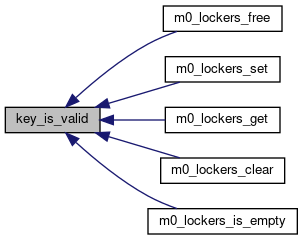Lockers
Data Structures | |
| struct | m0_lockers_type |
| struct | m0_lockers |
Macros | |
| #define | M0_LOCKERS_DECLARE(scope, name, max) M0_LOCKERS__DECLARE(scope, name, name, max) |
| #define | M0_LOCKERS__DECLARE(scope, name, amb, max) |
| #define | M0_LOCKERS_DEFINE(scope, name, field) M0_LOCKERS__DEFINE(scope, name, name, field) |
| #define | M0_LOCKERS__DEFINE(scope, name, amb, field) |
Functions | |
| static bool | key_is_valid (const struct m0_lockers_type *lt, int key) |
| M0_INTERNAL void | m0_lockers_init (const struct m0_lockers_type *lt, struct m0_lockers *lockers) |
| M0_INTERNAL int | m0_lockers_allot (struct m0_lockers_type *lt) |
| M0_INTERNAL void | m0_lockers_free (struct m0_lockers_type *lt, int key) |
| M0_INTERNAL void | m0_lockers_set (const struct m0_lockers_type *lt, struct m0_lockers *lockers, uint32_t key, void *data) |
| M0_INTERNAL void * | m0_lockers_get (const struct m0_lockers_type *lt, const struct m0_lockers *lockers, uint32_t key) |
| M0_INTERNAL void | m0_lockers_clear (const struct m0_lockers_type *lt, struct m0_lockers *lockers, uint32_t key) |
| M0_INTERNAL bool | m0_lockers_is_empty (const struct m0_lockers_type *lt, const struct m0_lockers *lockers, uint32_t key) |
| M0_INTERNAL void | m0_lockers_fini (struct m0_lockers_type *lt, struct m0_lockers *lockers) |
Detailed Description
Lockers module provides an interface to support storage of private pointers in parent structures. This allows not only for efficient sharing of data with others but also removes duplication of such interfaces. To describe a typical usage pattern, consider one wants a locker for 32 objects in object of type foo.
Following things have to be done:
- Declare a locker type by, M0_LOCKERS_DECLARE(scope, foo, 32) This will generate a structure of type foo_lockers and declarations for functions to manipulate foo_lockers. It is required that a structure of type foo must be present in the source.
- embed foo_lockers in struct foo
- Next, define a locker type by M0_LOCKERS_DEFINE(scope, foo, lockers)
Now to use this locker following interfaces can be used:
- foo_lockers_allot - Returns new key to access stored data.
- foo_lockers_set - Stores provided data against provided key.
- foo_lockers_get - Locates and returns data corresponding to the provided key.
- foo_lockers_clear - Clears the data stored at given key.
- foo_lockers_is_empty - Checks whether a data is stored at given key.
Lockers module does not provide any support against concurrency and validation of data stored at a given key, it is the responsibility of the invoker to take care of these aspects.
Please refer to unit test for understanding the nitty-gritty of lockers.
Macro Definition Documentation
◆ M0_LOCKERS__DECLARE
Value:
struct name; \
\
\
struct name ## _lockers { \
struct m0_lockers __base; \
void *__slots[(max)]; \
}; \
\
Definition: module.c:324
Definition: lockers.h:83
#define M0_BASSERT(cond)
Definition: idx_mock.c:47
◆ M0_LOCKERS__DEFINE
◆ M0_LOCKERS_DECLARE
◆ M0_LOCKERS_DEFINE
Function Documentation
◆ key_is_valid()
|
static |
◆ m0_lockers_allot()
| M0_INTERNAL int m0_lockers_allot | ( | struct m0_lockers_type * | lt | ) |
◆ m0_lockers_clear()
| M0_INTERNAL void m0_lockers_clear | ( | const struct m0_lockers_type * | lt, |
| struct m0_lockers * | lockers, | ||
| uint32_t | key | ||
| ) |
◆ m0_lockers_fini()
| M0_INTERNAL void m0_lockers_fini | ( | struct m0_lockers_type * | lt, |
| struct m0_lockers * | lockers | ||
| ) |
◆ m0_lockers_free()
| M0_INTERNAL void m0_lockers_free | ( | struct m0_lockers_type * | lt, |
| int | key | ||
| ) |
◆ m0_lockers_get()
| M0_INTERNAL void * m0_lockers_get | ( | const struct m0_lockers_type * | lt, |
| const struct m0_lockers * | lockers, | ||
| uint32_t | key | ||
| ) |
◆ m0_lockers_init()
| M0_INTERNAL void m0_lockers_init | ( | const struct m0_lockers_type * | lt, |
| struct m0_lockers * | lockers | ||
| ) |
◆ m0_lockers_is_empty()
| M0_INTERNAL bool m0_lockers_is_empty | ( | const struct m0_lockers_type * | lt, |
| const struct m0_lockers * | lockers, | ||
| uint32_t | key | ||
| ) |
◆ m0_lockers_set()
| M0_INTERNAL void m0_lockers_set | ( | const struct m0_lockers_type * | lt, |
| struct m0_lockers * | lockers, | ||
| uint32_t | key, | ||
| void * | data | ||
| ) |






